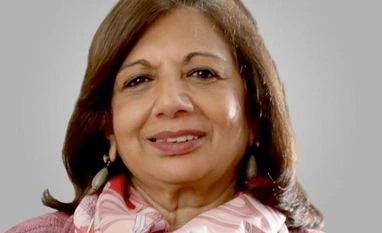The second wave of COVID-19 has hit India "like a tsunami", Biocon founder Kiran Mazumdar Shaw has said, attributing the unprecedented spike in coronavirus cases to the recent state elections and religious festivals in the country.
India is struggling with a second wave of the pandemic with more than 3,00,000 daily new coronavirus cases being reported in the past few days, and hospitals are reeling under a shortage of medical oxygen and beds.
This time around the second wave has hit like a tsunami. And the unfortunate part is it has not spared any part of our country, Mazumdar said during a virtual panel discussion on global vaccine equity organised by One Share World.
This time around both urban India and more frighteningly it is rural India that has also got infected because we did have a bunch of state elections and a number of religious festivals that have really, really added to this horrific surge, she said.
India had Assembly polls in West Bengal, Tamil Nadu, Kerala, Assam and Puducherry in March and also there was a religious congregation in Haridwar during that time.
Because of the surge of the infection and this virus, it has created an enormous demand on hospital infrastructure.
More From This Section
So hospital beds and oxygen, we don't have enough human resources to manage the kind of numbers we're seeing today. We don't have enough medicines to treat patients with. We don't have enough medical supplies of most types to deal with this pandemic, she said.
Above all, we don't even have enough vaccines to vaccinate people fast enough, she said adding that the enormity of the population makes it more challenging. She welcomed the global community coming forward to help India with COVID-19 assistance.
Over 40 countries have committed to provide India urgently required medical supplies like oxygen-related equipment and critical medicines to help it deal with an unprecedented second wave of the coronavirus pandemic, foreign secretary Harsh Vardhan Shringla said in New Delhi last week.
If India is not safe, I can tell you the world is not safe, Mazumdar said. GAVI chief Seth Berkley said that the India crisis has made it difficult for the availability of vaccines.
Part of the problem is with the India situation, India is one of our major suppliers. They wanted to make sure vaccines could focus on the needs in India. So right now we have a shortage of vaccines and one of the challenges is how do we get countries to now share, he said.
What's interesting is the wealthy countries, because we didn't know at the beginning, whether any of these vaccines were going to work or which ones have bought a whole portfolio of vaccines like we have. What that means is that already it's estimated that there's more than 1.5 billion excess doses that will exist in high-income countries, he said.
Berkley said the challenge is can they get those high-income countries to donate those vaccines and make them available.
India at the start of this year, felt so complacent and confident that it was in fact, even donating vaccines to certain parts of the world before this second wave hit the country, said Mazumdar.
And now of course, we just need to ramp up vaccine production as much as we can to deal with this crisis, she said.
WHO Director General Tedros Adhanom said that global supply of vaccines is limited.
We have an ethical, epidemiological and economic imperative to deploy vaccines as equitably as possible. Vaccine nationalism will only problem the pandemic, the economic turmoil it causes the restrictions on travel and trade and increase the chances of a variant emerging that evades vaccines, he said.
New coronavirus cases and deaths in India hit a record daily high with 4,12,262 new infections and 3,980 fatalities being reported, taking the total tally of COVID-19 cases to 2,10,77,410 and the death toll to 2,30,168, according to the Union Health Ministry data updated on Thursday.
)